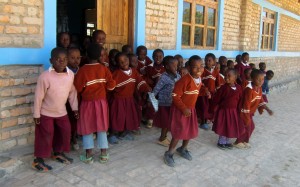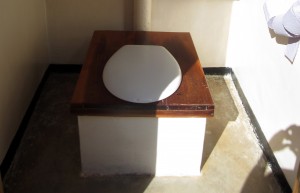 Gram Vikas USA is a 501(c)(3) non-profit organization with a vision to transform the behaviors and attitudes of rural communities within the context of hygiene and sanitation. Founded in 2012, we started our first project in in the Iringa province of Tanzania in 2013.
Gram Vikas USA is a 501(c)(3) non-profit organization with a vision to transform the behaviors and attitudes of rural communities within the context of hygiene and sanitation. Founded in 2012, we started our first project in in the Iringa province of Tanzania in 2013.
Gram Vikas USA mobilizes, educates, and trains communities on how to construct, manage, and maintain their own sanitation facilities. We help awaken a community’s ability to independently sustain their own sanitation network through cooperative participation and management systems such as financial training, construction skill building, and hygiene education workshops. Equitable financial, institutional, and growth mechanisms ensure that all families have, and will continue to have, access to sanitation facilities.
Our Model
Movement and Action Network for Transformation of Rural Areas (MANTRA)
 The flagship program of Gram Vikas USA provides long lasting solutions to health problems arising from the use of unclean water and unhygienic waste disposal habits of rural people. We help mobilize communities to pool their resources and work together to overcome these issues. As part of the program, identical toilets and bathing rooms are constructed for each household drawing clean piped water from a community-constructed water tank. MANTRA is based on the following core values:
The flagship program of Gram Vikas USA provides long lasting solutions to health problems arising from the use of unclean water and unhygienic waste disposal habits of rural people. We help mobilize communities to pool their resources and work together to overcome these issues. As part of the program, identical toilets and bathing rooms are constructed for each household drawing clean piped water from a community-constructed water tank. MANTRA is based on the following core values:
- Inclusion: all households in a village are included irrespective of class divides.
- Social equity: everyone participates in and contributes towards the program. Households that cannot afford to participate are subsidized to facilitate inclusion.
- Gender equity: women and men have equal say in the decision making process and all opinions are weighed equally.
- Cost sharing: villagers can participate using labor, materials, and many times through cash contributions although there is a social cost that government, the private sector, and society in general must bear.
- Sustainability: financial, institutional, and environmental sustainability are the hallmarks of the program. An endowment fund called “Village corpus” is deposited in a bank and the interest generated is used to support new families. In addition, each family contributes towards a maintenance fund to meet the operation and maintenance expenses of the water supply systems. Institutional sustainability is achieved by involving all families in the decision making process to establish governance. Environmental sustainability involves using recycling-based green technology that does not depend on external energy.
